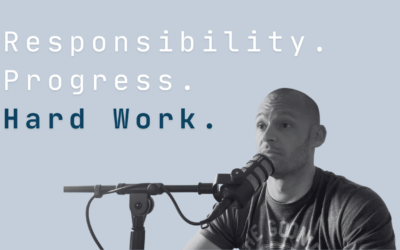Introduction
What we do each and every day, our routine, is one of the most important aspects of our lives. Since so many of these activities are mundane and sometimes performed without even thinking about them, this importance often gets overlooked. But the things we habitually do day in and day out end up taking up most of our time in the long run and can set us on either the path to success or the path to failure. Simply put, if we can fix our daily routines and make sure they serve us, we can fix our lives.
Our Daily Routines As Addicts
Over a prolonged period of time, active addiction creates daily routines that slowly eat away at us. In all likelihood, when we were still using, we weren’t eating properly, we weren’t sleeping well, we weren’t hanging out with the right people, and we weren’t putting ourselves in healthy environments.
The outcome of these crappy daily routines range from failed marriages and relationships with friends and family, legal trouble, financial woes, health problems, poor mental states, the list goes on and on.
At some point we each recognized that despite our best efforts, these habits were never going to lead to a positive outcome. We decided to give them up, to remove them from our lives. This was critical but it’s just as important to commit to forming new daily habits that will improve our lives and lead us down the path to success.
“Your current life is the result of your previous choices, if you want something different, begin to choose differently.” – Joe Tichio
The Power of Routines and Habits
The true power of our daily routines and habits is their ability to facilitate real progress that compounds over time. Without taking action, all the planning in the world won’t get us anywhere. Since routines and habits imply taking some action, a well formed routine can reliably move us from point A to point B.
Say we have two people, both of whom want to write a book. The first person (let’s call her Susan) tries to write when she can in her free time but her life, like all of us, is busy and she ends up writing a couple times a week for a few hours each time. By the end of the week she writes about 6 hours at this pace. Our second person (let’s call him Jim) sets a daily routine that incorporates two hours of writing each morning before his other job. At first this is hard, but after some time it just becomes something he does and he manages to stick to his schedule consistently, without fail. At this pace, by the end of the week he manages to write 14 hours.
At first glance, Jim clearly does more writing than Susan. He writes 8 more hours than her per week. The true leverage his routine gives him is that over time this difference in hours and skill grows larger and larger–it compounds. If we look at the results over the course of a year, Jim has written 728 hours whereas Susan has written 312 hours. Now, Jim has written 416 more hours than Susan. How many more words do you think Jim has written over the course of those hours? How much better do you think his writing has gotten?
Our routine gives us the ability to focus on what tasks are important to us and makes sure we consistently get them done. When we factor in our ability to get better at something the more we do it, our progress compounds on itself leading to exponential results.
Tips for Forming Daily Routines
1. Start small, think big
Adding too much at once to our daily routine could be counterproductive. You have a higher likelihood of sticking with added tasks if you add one or two at a time and slowly build from there.
When we first start out scheduling a new daily routine, we usually have big plans that will create a dramatic shift in our lives. This is great and what is required if we want to change our path in life, but can become overwhelming if done all at once.
Choosing one large task and one small task and giving them time to stick can be an effective strategy. As an example, you might add one hour of exercise each day (a large task) and take a multivitamin (a small task) to your routine and make sure you are consistently completing them before adding anything further.
The goal is to build up new habits so we perform these tasks without even thinking about them. They just become who we are. Studies have shown that it can take over 2 months before a new behavior becomes automatic, and this can vary widely from person to person. You should experiment for yourself how long it takes you to build a new habit and become comfortable altering your routine further. For myself, I generally allow myself a few weeks of repeating a task daily before it is comfortably integrated into my schedule.
2. Determine what time you will perform each task
Defining a schedule and determining what time we will perform each task, at least generally, helps us not procrastinate and allows us to be held accountable. If we just have a large list of stuff we want to get done each day, and just decide we will do them when we feel it’s convenient, it’s highly likely we just won’t get them done.
When adding a new task to our schedule, think what the best time will be each day to get it done. This can be changed later and probably will require a little experimentation, but setting times to work on something or perform a task stops us from just putting it off until “later” or never completing it.
3. Be specific
We need to specifically define the details of the tasks we wish to incorporate into our routine and how they will be performed. For example, if we wish to start reading each day the question becomes, how much? Will we read for an hour each day? Or will we set a target of 30 pages each day? What is necessary for the task to be considered completed?
Getting specific gives us the ability to track our progress and hold ourselves accountable. In our previous example, if we had simply set a goal to read each day without clearly defining targets, reading anything at all for any length of time satisfies the requirements, but probably isn’t what we were looking to accomplish.
4. Keep track of your progress (hold yourself accountable)
It is easier today than ever to quickly and effectively measure the progress of our daily routines. Thanks to a million and a half apps specifically defined for this purpose we can track the data related to our daily routines down to the most minute detail. Some people may find this enticing, but for many it becomes overwhelming and overloads them with information.
Simply creating a list of the tasks we wish to perform each day, and checking them off as we complete them is totally sufficient for most and a great starting point. The benefit of this is twofold.
First, externalizing the sometimes long list of tasks gets them off our mind and allows us to concentrate on what we are accomplishing in the moment. We don’t want to be worrying about all the other stuff we have to do and lose focus of the task at hand. Second, we feel a sense of accomplishment as we check completed tasks off our to-do list, which will motivate us to continue forward and complete the rest of them.
This type of simple system holds us accountable as there is an explicit system for tracking whether or not we actually did what we set out to do. On days where we don’t feel like working out, reading, studying or going to a meeting, it’s likely that we also don’t want to look at a list of incomplete tasks at the end of the day, which increases the likelihood that we do them anyways.
5. Finish your most important tasks first
You should schedule what tasks provide the most value earliest in your day. If by afternoon something happens and your day goes to hell, what would you be happy to have already gotten done? The most important thing is the most important thing–treat it as such.
By scheduling things earlier in the morning it’s also less likely that the time we set aside for it gets taken up by something or someone else. Our time is our most valuable resource, and things are constantly competing for our attention. Utilizing the time with the least amount of competition, before other people are up and going about their days, gives you the ability to focus on what you need to without distractions.
6. Your routine should be the process that achieves your goal
If we view our overall goals for life as the “what,” then our daily routines are the “how.” They are simply the processes and repeated actions that move us closer to what we want our life to look like.
It’s important then that we first determine what our goals actually are, and then create our daily routines to support the completion of those goals. If we are looking to lose 10 pounds over the course of the next month, the daily process that would support that could be 20 minutes of cardio and 40 minutes of lifting weights.
If there is no clear reason behind the habits we do each and every day, we should examine them to see why we are actually performing them. Then we can determine whether or not they are serving us in a positive way.
Wrapping This Up
Without a doubt, our daily routines and habits were fucked during active addiction. Everyone has a different story and experience with addiction, so how much work you have to do depends, but its guaranteed that some work needs to be done regarding our daily routine when in recovery.
The things we do each and every day, from the big to the small, are our life. In order to fix our lives past just staying clean and sober, this is where we begin. Given enough time and enough repetion, a daily routine focused on the processes required to accomplish our goals can totally transform our lives.
Take the next step. Determine what some goals are for yourself and what is required to make this a reality. Determine what you can do each and every day that will move you one step closer and create a plan. Most importantly though, take action and implement it.





